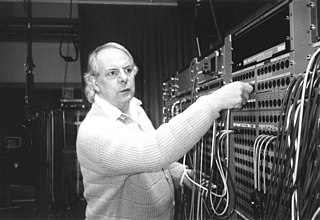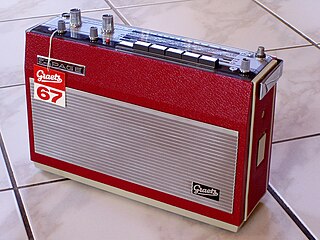Related Research Articles

Karlheinz Stockhausen was a German composer, widely acknowledged by critics as one of the most important but also controversial composers of the 20th and early 21st centuries. He is known for his groundbreaking work in electronic music, for introducing controlled chance into serial composition, and for musical spatialization.
In music, serialism is a method of composition using series of pitches, rhythms, dynamics, timbres or other musical elements. Serialism began primarily with Arnold Schoenberg's twelve-tone technique, though some of his contemporaries were also working to establish serialism as a form of post-tonal thinking. Twelve-tone technique orders the twelve notes of the chromatic scale, forming a row or series and providing a unifying basis for a composition's melody, harmony, structural progressions, and variations. Other types of serialism also work with sets, collections of objects, but not necessarily with fixed-order series, and extend the technique to other musical dimensions, such as duration, dynamics, and timbre.
Contemporary classical music is classical music composed close to the present day. At the beginning of the 21st century, it commonly referred to the post-1945 modern forms of post-tonal music after the death of Anton Webern, and included serial music, electronic music, experimental music, and minimalist music. Newer forms of music include spectral music, and post-minimalism.

Karlheinz Essl is an Austrian composer, performer, sound artist, improviser, and composition teacher.
Kreuzspiel is a composition by Karlheinz Stockhausen written for oboe, bass clarinet, piano and four percussionists in 1951. It is assigned the number 1/7 in the composer's catalogue of works.
David C. Johnson is an American composer, flautist, and performer of live-electronic music.

Mantra is a composition by the German composer Karlheinz Stockhausen. It was composed in 1970 and premiered in autumn of the same year at the Donaueschingen Festival. The work is scored for two ring-modulated pianos; each player is also equipped with a chromatic set of crotales and a wood block, and one player is equipped with a short-wave radio producing morse code or a magnetic tape recording of morse code. In his catalogue of works, the composer designated it as work number 32.
Gregg Wager is an American composer, pianist, and music critic. He studied composition at the University of Southern California and the California Institute of the Arts. His teachers included Morton Subotnick and Morten Lauridsen. His piano teachers included Yuriy Oliynyk, Doris Stevenson, and Chester Swiatkowski. In 1996, he earned a Ph.D. in musicology at the Free University Berlin.
Rolf Rainer Gehlhaar, was an American composer, Professor in Experimental Music at Coventry University and researcher in assistive technology for music.
Alden Jenks is an American composer.
Gerald M. Shapiro is an American composer of acoustic and electronic music.
Gilberto Mendes was a Brazilian composer.
Nicholas Isherwood is a Franco-American bass singer, who specialises in contemporary and baroque music. Notable roles include "Lucifer" in the world premieres of Stockhausen’s Montag, Dienstag, and Freitag from Licht at La Scala and the Leipzig Opera, and in Donnerstag aus Licht at Covent Garden.
John McGuire is an American composer, pianist, organist, and music editor.

Kurzwellen, for six players with shortwave radio receivers and live electronics, is a composition by Karlheinz Stockhausen, written in 1968. It is Number 25 in the catalog of the composer’s works.

Mixtur, for orchestra, 4 sine-wave generators, and 4 ring modulators, is an orchestral composition by the German composer Karlheinz Stockhausen, written in 1964, and is Nr. 16 in his catalogue of works. It exists in three versions: the original version for full orchestra, a reduced scoring made in 1967, and a re-notated version of the reduced scoring, made in 2003 and titled Mixtur 2003, Nr. 162⁄3.
Thomas Wells is an American composer, pianist, organist, and arts-organization administrator.

Ensemble is a group-composition project devised by Karlheinz Stockhausen for the 1967 Darmstädter Ferienkurse. Twelve composers and twelve instrumentalists participated, and the resulting performance lasted four hours. It is not assigned a work number in Stockhausen's catalogue of works.

Musik für ein Haus is a group-composition project devised by Karlheinz Stockhausen for the 1968 Darmstädter Ferienkurse. Fourteen composers and twelve instrumentalists participated, with the resulting performance lasting four hours. It was not regarded by Stockhausen as a composition belonging solely to himself, and therefore was not assigned a number in his catalog of works.
Doris Stockhausen is a German music pedagogue. She was the first wife of Karlheinz Stockhausen who dedicated several compositions to her, beginning with Chöre für Doris in 1950 before they were married.
References
- "Will Johnson Professor of Music (Emeritus) biography page". School of Performing Arts - SSU . Archived from the original on 27 September 2011. Retrieved 4 August 2018.
- ↑ Kramer, Jonathan D. 1998. "Karlheinz in California: A Personal Reminiscence." Perspectives of New Music 36, no. 1 (Winter):247–61. p. 248